It is hard to find a nation or a race which has not changed during history; it is hard to find at least one modern nation who has remained exactly the same pure as their ancient grand-grand parents, but it is even harder to find a nation or a race which differ so much culturally and ethnically from their pretended ancestors. This nation is called Modern Greeks. Ironically, it is exactly the elite of the above nation, notoriously stressing out their pure and unaltered identity, although millennia distance this new nation from their ‘wannabe the same’ ancestors.
About 200 years ago, a new state was proclaimed, bearing the mysterious ancient name, Hellas. The new Hellenes began now to make every effort to bring about evidences of connections to their lost and forgotten ancestors. These ‘evidences’ although scarce, superficial and often speculative were intended to effect a junction between two very different realities, one lost and virtual but romantically suggested from some western scholars, the other so naked from anything great or noble. Not being for political reasons, even the most enthusiast of the Ancient Greeks among the western scholars would not have suggested the modern pre-revolution population having any tie to them.
A nation is usually a group of people, taken hand by hand for reasons like religion, language, origin or blood. When it comes to Ancient Hellenes, if we trust the old accounts about them, they were obviously not people of the same pure ethnic origin, but surely they had the same religion. This is the same to the modern Hellenes, what made these people of different ethnic background joining one-another hand by hand was by no means their common ethnic “Greek” origin, nor was their common “Greek” national conscience, but their religion, that was substantially different from the Ancient Greek one. The idea that Modern Greeks speak a continuation of the Ancient Greek language offers a wide field for improvements, and is just an illusion. The western scholars seem to have exaggerated the ties that connect Modern Greek language to the Ancient one, which by no means are natural. The modern Greek language clearly seems to be the continuation of the spoken official Byzantine Empire language, which came into being during the rule of Byzantine emperor Heraclius in 620 AD, since the knowledge of it remained the only possible way to learning. That was the only path through which the Byzantine Empire and Church were applying respectively their political and religious authority and power. So the term “Greek”, used so often during the Byzantine Empire lifetime(and after that) is not a term used to define an ethnic Greek, a descendent of mythical Achilles, Pericles or Leonidas, but one used toward a person who had political or religious powers, or/and a person who is not illiterate, who at least know how to write and read his name in the only written language available.
For as long as the last 200 years the new nation of the Greeks is creating myths and making claims, based only on mythical stories of the past, now on become like a sport.
The most preferred thesis are those based on historical stereotypes, choosing selective quotes from ancient and modern authors, and the people doing this job look like a bunch of notorious whistleblowers. The internet is the place where the noise of this propaganda takes an epic shape, and although its myths are being exposed everyday, it keeps recycling the same myths over and over again. One very romantic Greek quote is the following :
Αρχή Ελλάδος από Ωρυκίας και αρχέγονος Ελλάς Ήπειρος
Greece starts at Oricus and the most ancient part of Greece is Epirus.
This is a quote, pretended to be a statement of Ptolemy, the geographer. Today this quote is used from many kinds of internet rats, but about a century ago, had been used as an official argument from the Greek state representatives, to include within Greece, the lands which starts at Orikus, or otherwise called Epirus.
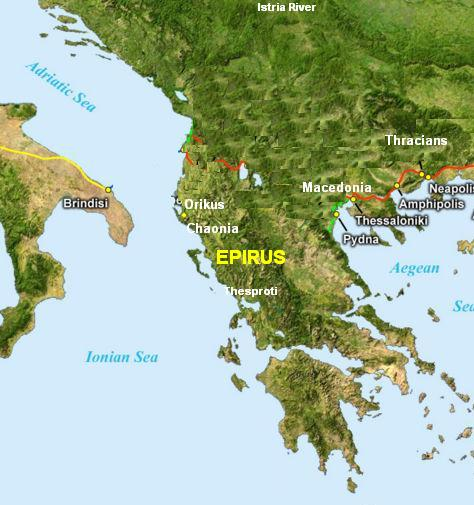
Of course this argument had been dismissed from European officials as unreliable, abusive and speculative. Even if it would be authentic and real, this is not a meaningful argument but just a perception of an author. It also doesn’t explain anything about the meaning of Greece and its inhabitants leaving alone the fact that nobody could draw parallels between the modern states and nation, and those of the past. It’s easy for someone who wants to oppose this pseudo-quote with much more reliable quotes from the same period of time and authors. For example:

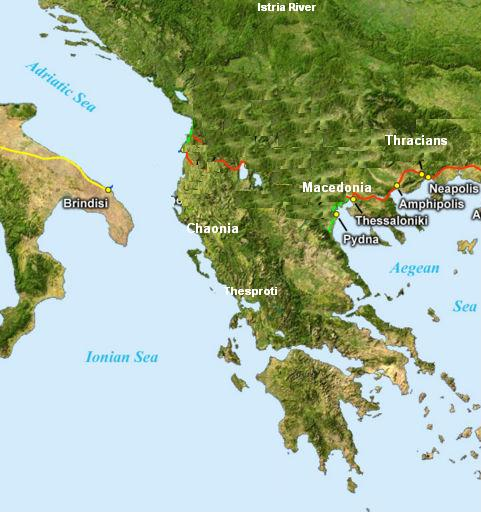
But still, even though the quote is quite direct, solid, reliable, and clear beyond any doubt it must not be used as a mean to back up nationalistic pretenses, since it represents a very old reality, which normally might have changed during times, and cannot be compared with the modern one in any aspect.
For any quote taken from presumed ancient authors, offered as argument by Greek propaganda rattling, one could find double or more the numbers and quality quotes from the same sources, but for the reason above they do not represent the ultimate evidence for both sides.
Is more reasonable to take for analyzes the later time, so if we do this for the medieval time, Albanians have many reasons to believe that they are the Epirotes, since all independent external and internal sources spontaneously confirm this. For example:
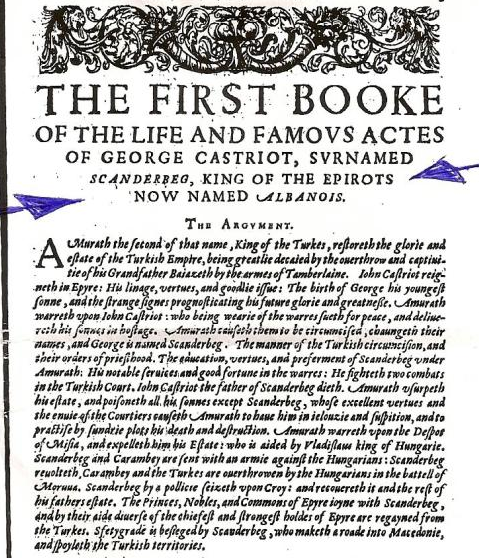
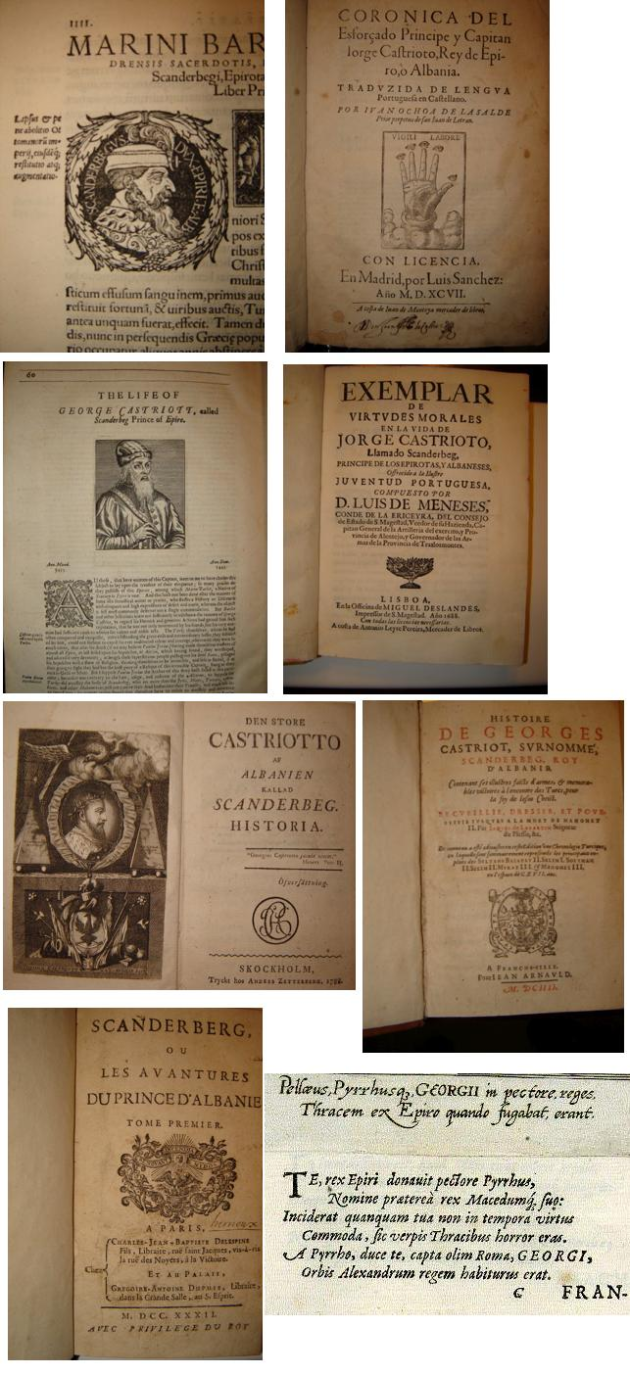
When it comes to the Greeks no, a Medieval Romaioi(Ῥωμαίοι) was usually a good citizen of Eastern Roman Empire, but not a Hellene, like Modern Greeks call themselves today.
Hellene was a name forgotten in the past, as Nikos Dimou says:
“We used to speak Albanian and call ourselves Romans, but then Winckelmann, Goethe, Victor Hugo, Delacroix, they all told us, ‘No, you are Hellenes, direct descendants of Plato and Socrates,’ and that did it. If a small, poor nation has such a burden put on its shoulders, it will never recover.”
We must not blame the Modern Greeks believing to be Ancient Hellenes. The blame must go to several romantic western philhellenes, like the above who sometimes imposed that idea in such degree that most of Greeks even today believe to be the only people in Europe who represent human mental and appearance perfection and thus any nationalistic pretense coming from them must be fulfilled from other Europeans.
Modern Hellenes really believe that their pride for their country is the same with that of Alexander towards Greece of that forgotten time. No Alexander was just a ruler, whose nationality might be different from all today Balkanic nations, especially Greeks, who do not share the same religion with him, they don’t share the same ‘in block’ culture and traditions with him , don’t share the same language (even though they think they do), and of course they don’t descent his blood since by no means the ethnic mixture named Greeks today represent one pure distinct blood, their blood is the most non-homogeneous blood from all other Balkanic nations, and no one expects to find some percentage of pure Hellenic in it since this word doesn’t make any sense itself.
Alexander was just a powerful ruler, who can’t rule now even upon his lost grave, and thus his name must not be used to rule over others history and culture. The Greek propaganda has successfully achieved the goal, convincing many people, especially the Greeks themselves, that Alexander was a Greek king fighting for the Greek national pride only, and to spread Hellenic culture only. This is just an illusion, Alexander the Great was just a usurper, who was fighting only for his ego, to rule over as many as possible different people. He was not a person who cared about Greek culture, Greek people or Greece, but just an unscrupulous invader who together with his father attacked first the Greece(whatever it meant) among the others. He was not taking care about Greeks, Greek culture, or Greek cities, it’s been him together with his father who razed to the ground Thebes, the greatest “”Greek”” city, and massacred its entire population. It was him and before him his father who was about to erase Athens itself from the face of earth. It was his father who often refused to recognize Hellenic identity(whatever it meant) and Greece itself. In a passage where Romans demanded him to evacuate Greek cities, he sarcastically named Greece a meaningless word, and a territory often not inhabited by the so called Hellenes :
POLYBIUS – ‘THE RISE OF THE ROMAN EMPIRE’, HISTORIES Book XVIII.5
Ῥωμαίοις καὶ κελεύοντες ἐκχωρεῖν Μακεδόνας ἁπάσης τῆς Ἑλλάδος: τοῦτο γὰρ ἀναφθέγξασθαι καὶ καθόλου μέν ἐστιν ὑπερήφανον, οὐ μὴν ἀλλὰ Ῥωμαίων μὲν λεγόντων ἀνεκτόν, Αἰτωλῶν δ’ οὐκ ἀνεκτόν: ποίας δὲ κελεύετέ με” φησὶν ” [8] ἐκχωρεῖν Ἑλλάδος καὶ πῶς ἀφορίζετε ταύτην; αὐτῶν γὰρ Αἰτωλῶν οὐκ εἰσὶν Ἕλληνες οἱ πλείους: τὸ γὰρ τῶν Ἀγραῶν ἔθνος καὶ τὸ τῶν Ἀποδωτῶν, ἔτι δὲ τῶν Ἀμφιλόχων, οὐκ ἔστιν Ἑλλάς. [9] ἢ τούτων μὲν παραχωρεῖτέ μοι.
But the most outrageous part of their conduct is that they try to rival Rome, and bid me entirely evacuate Greece! The demand in itself is sufficiently haughty and dictatorial: still, in the mouths of Romans, it is tolerable, but in that of Aetolians quite intolerable. ‘What is this Greece which you demand that I should evacuate, and what do you define Greece? Certainly most of the Aetolians themselves are not Greeks!. The countries of the Agraae, the Apodotea, and the Amphilochians cannot be regarded as Greeks. So do you allow to me to remain in those territories.
It is quite understandable, that beyond political rhetoric was no ethnic or national affection for the Greeks from the father of the “greatest proud to be Greek ever”, Alexander the Great..
But to achieve their goal, the modern Greek intellectuals, call in their service a high amount of quotes and opinions from the modern authors where Nicholas. G. Hammond is the most celebrated. Let’s look at two of them, being used often for that purpose.
N. G. L Hammond, “Philip of Macedon”, Duckworth, London, 1994
Epirus was a land of milk and animal products…The social unit was a small tribe, consisting of several nomadic or semi-nomadic groups, and these tribes, of which more than seventy names are known, coalesced into large tribal coalitions, three in number: Thesprotians, Molossians and Chaonians…We know from the discovery of inscriptions that these tribes were speaking the Greek language (in a West-Greek dialect).This superficial analyzing and conclusion is what Greek propaganda uses to back up their claims, but we all know that this reasoning unfortunately shows anything other than lack of knowledge in linguistics and onomastics from the author side. It is the same author that rather than using his professional expertise, expresses this:
“The Cambridge Ancient History: Volume 6, the Fourth Century BC” by D M Lewis, Martin Ostwald, Simon Hornblower, John Boardman
That the molossians, who were immediately adjacent to the Dodonaeans in the time of Hecataeus but engulfed them soon afterwards, spoke Illyrian or another barbaric tongue was nowhere suggested, although Aeschylus and Pindar wrote of Molossian lands. That they in fact spoke greek was implied by Herodotus’ inclusion of Molossi among the greek colonists of Asia minor, but became demonstranable only when D. Evangelides published two long inscriptions of the Molossian State, set up p. 369 B.C at Dodona, in Greek and with Greek names, Greek patronymies and Greek tribal names such as Celaethi, Omphales, Tripolitae, Triphylae, etc. As the Molossian cluster of tribes in the time of Hecataeus included the Orestae, Pelagones, Lyncestae, Tymphaei and Elimeotae,as we have argued above, we may be confindent that they too were Greek-speaking;And again demonstrating himself not only superficial and impartial, since he bases his definite conclusion only in two inscription ‘discovered’ from a Greek archeologist in Epirus, while large non-Greek areas are full of those, but is also very ignorant in language, since he is unable to realize that the language widely recognized and labeled as Greek, was not specifically Greek, but a written version of a language spoken from a much wider and larger group of people than the so called Hellenes, where the latter were neither only speaking that language nor originators of it in this regard.
Hammond and whoever picks quotes from him are at least incapable to understand that the label “Greek” on names, patronymies, is directional but completely inappropriate to specify the ethnicity of the subjects taken in analyses, because if we follow the same logic with his in the underlined passage:

We have all the reasonable rights to equalize the ethnicity of Illyrians with that of the Greeks, who not only had many same tribal names but also personal names in great abundance too. This very visible fact was ignored from Hammond and his fans, since they are not willing to claim Illyrians the same ethnicity with Hellenes, following double standards in their reasoning. But the old accounts from antiquity suggest us not only a strong connection between Illyrians and Hellenes, which for the sake of truth was stronger than that between Hellenes and Epirotes, but also suggests that the purest known Hellenic tribe, the Hylleis or otherwise called Heraclides since Hyllos was the son of Heracles, originated exactly from the Illyrians Byllinoi or Hyllinoi.
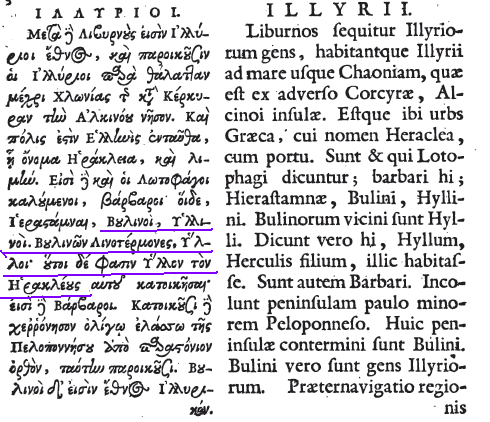
There is no Illyrian coin found in their territory, being stamped in a language other than “”Greek””, but that doesn’t make them “Greeks”, and for the same reason this doesn’t make Epirotes or Thracians as Greeks.
Mr. Hammond has written a very long article about the Atintani where he desperately tries to prove that these Illyrian Atintani were different from Epirotic Atintani, but he completely fails to mark either of them on his map:
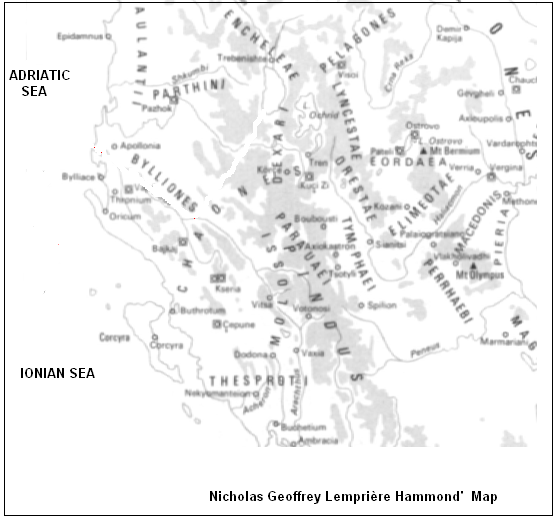
Intentionally ignoring the possibility that “both” Atintanes were one and the same, who look Illyrian from Polybius prospective but Epirote from Strabo’s one, a very significant fact that these confusion between ancient authors had been created only for the simple possible reason that the Illyrians and Epirotes were ethnically not very different.
It is always Hammond who never looses the chance to stress out the fact that Strabo was classifying the Perrhaebi as Greek(where ????).
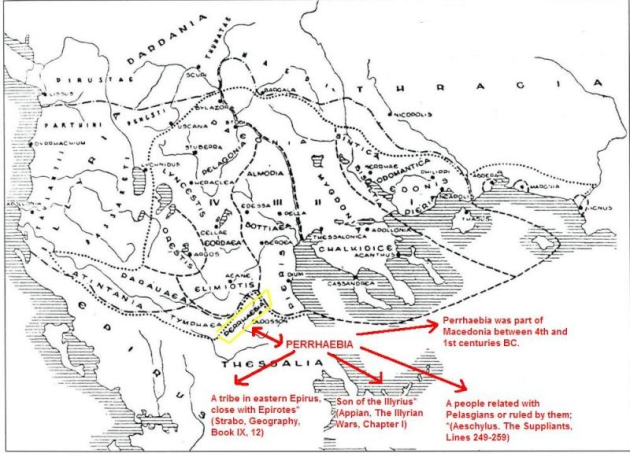
Avoiding again to consider the possibility that the Perrhaebi were also known as a very important branch of the Illyrians might be the same tribe with those supposedly labeled from Strabo as Greek. His reasoning that since Perrhaebi were Epirotes(only from a vague quote from Strabo, Geography IX.5.12) and since “he is confident” they had spoken “Greek”, is enough for Greek propaganda to claim them as Greeks, in the already under their control internet page Wikipedia:
The Perrhaebi (Ancient Greek: Περραιβοί) were an ancient Greek people who lived in northern Thessaly.Telling the truth we do not expect better from such unscrupulous propaganda, but let us bring the quote where Hammond bases his pretenses that Perrhaebi were Greeks.
Strabo, Geography IX.5.12
ἡ δὲ Πίνδος ὄρος ἐστὶ μέγα, πρὸς ἄρκτον μὲν τὴν Μακεδόνων, πρὸς ἑσπέραν δὲ Περραιβοὺς μετανάστας ἀνθρώπους ἔχον, πρὸς δὲ μεσημβρίαν Δόλοπας, πρὸς ἕω δὲ .
αὕτη δ’ ἐστὶ τῆς Θετταλίας· ἐπ’ αὐτῇ δὲ τῇ Πίνδῳ
The Pindus Mountain is large, having the country of the Macedonians on the north, the Perrhaebian immigrants on the west, the Dolopians on the south, and Hestiaeotis on the east; and this last is a part of Thessaly.
Also
009.005.022
οἱ δὲ Περραιβοὶ τινὲς μὲν συσταλέντες περὶ τὰ ἑσπέρια τοῦ Ὀλύμπου μέρη κατέμενον αὐτόθι πρόσχωροι ὄντες Μακεδόσι, τὸ δὲ πολὺ μέρος εἰς τὰ περὶ τὴν Ἀθαμανίαν ὄρη καὶ τὴν Πίνδον ἐξέπεσε·
As for the Perrhaebians, some of them drew together round the western parts of Olympus and stayed there, being neighbors to the Macedonians, but the greater part of them were driven out of their country into the mountains round Athamania and Pindus
As easily seen at Strabo’s work, nowhere was it suggested Perrhaebi as Greeks, but apparently Hammond was putting forth his desire to assume anything as Greek or Greek related.
The quotes from other authors in regards of the Perrhaboi are clear like the sun’s light, in Appian statement the Perrhaebi were a major branch of the Illyrians:
APPIAN, The Foreign Wars ( The Illyrian Wars) Ill. 1.1
Ἰλλυριῷ δὲ παῖδας Ἐγχέλεα καὶ Αὐταριέα καὶ Δάρδανον καὶ Μαῖδον καὶ Ταύλαντα καὶ Περραιβὸν γενέσθαι, καὶ θυγατέρας Παρθὼ καὶ Δαορθὼ καὶ Δασσαρὼ καὶ ἑτέρας, ὅθεν εἰσὶ Ταυλάντιοί τε καὶ Περραιβοὶ καὶ Ἐγχέλεες καὶ Αὐταριεῖς καὶ Δάρδανοι καὶ Παρθηνοὶ καὶ Δασσαρήτιοι καὶ Δάρσιοι.
Illyrius had six sons, Encheleus, Autarieus, Dardanus, Mædus, Taulas, and Perrhæbus, also daughters, Partho, Daortho, Dassaro, and others, from whom sprang the Taulantii, the Perrhæbi, the Enchelees, the Autarienses, the Dardani, the Partheni, the Dassaretii, and the Darsii. Autarieus had a son Pannonius, or Pæon, and the latter had sons, Scordiscus and Triballus, from whom nations bearing similar names were derived.
If someone finds the above quote controversial with that of Aeschylus:
Aeschylus, Suppliant Women 234
Βασιλεύς
πρὸς ταῦτ’ ἀμείβου καὶ λέγ’ εὐθαρσὴς ἐμοί.
τοῦ γηγενοῦς γάρ εἰμ’ ἐγὼ Παλαίχθονος
ἶνις Πελασγός, τῆσδε γῆς ἀρχηγέτης.
ἐμοῦ δ’ ἄνακτος εὐλόγως ἐπώνυμον
γένος Πελασγῶν τήνδε καρποῦται χθόνα.
καὶ πᾶσαν αἶαν, ἧς δι’ ἁγνὸς ἔρχεται
Στρυμών, τὸ πρὸς δύνοντος ἡλίου, κρατῶ.
ὁρίζομαι δὲ τήν τε Περραίβων χθόνα,
Πίνδου τε τἀπέκεινα, Παιόνων πέλας,
ὄρη τε Δωδωναῖα. συντέμνει δ’ ὅρος
ὑγρᾶς θαλάσσης: τῶνδε τἀπὶ τάδε κρατῶ.
αὐτῆς δὲ χώρας Ἀπίας πέδον τόδε
πάλαι κέκληται φωτὸς ἰατροῦ χάριν.
King
As for that, answer and speak to me with confidence. For I am Pelasgus, offspring of Palaechthon, whom the earth brought forth, and lord of this land; and after me, their king, is rightly named the race of the Pelasgi, who harvest the land. Of all the region through which the pure Strymon flows, on the side toward the setting sun, I am the lord. There lies within the limits of my rule the land of the Perrhaebi, the parts beyond Pindus close to the Paeonians, and the mountain ridge of Dodona; the edge of the watery sea borders my kingdom. I rule up to these boundaries.
I have to answer that being Illyrian does not rule them out of being Pelasgian too.
I also want to expose the pretenses which aim to claim Pelasgians just a branch of the Hellenes from Peloponnesus raised from a selective quote.
It is the other way around, Pelasgians were a dominant race, and all other races of antiquity(whatever it meant) like Illyrians, Hellenes, Macedonians, Thracians and all other subgroups were just offspring of them.
The idea that Pelasgians ceased to exist when the Hellenes increased their power, replacing them entirely, is wrong and is a complete speculation. It’s true that Hellenes as a partition of the Pelasgians who stopped calling themselves under this name, but it was the name Pelasgians that has been sporadically used to identify the other offspring. In his book 9.2.4 when Strabo talk about: Thracian pretense, he clearly identifies Thracians [the second World largest race(whatever it meant) of the time], as Pelasgians. That clearly shows that Pelasgians never ceased to exist or never were exterminated, but falling into partitions had lost their common name, and were called Illyrians, Thracians, Hellenes, Etruscans Macedonians etc.
Hammond is not the only philhellene who is or plays the ignorant in certain situations, Simon Hornblower and Antony Spawforth in their The Oxford Classical Dictionary 2003 write about Perrhaebi:
“Neither however played any significant role in history”This is not true at all, Perrhaebi were a very powerful Pelasgian (Strabo 9.5.20) tribe:
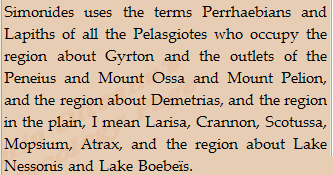
Who were occupying since at least Homeric times until Philip conquered them, the land around Dodona and Olympus:
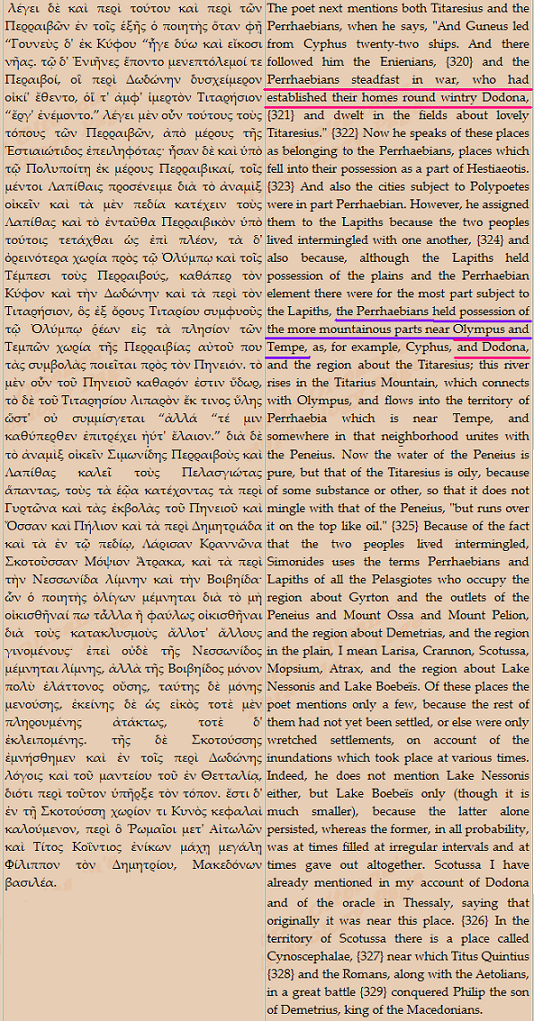
making them probably one of the most important tribe of antiquity. And they were Pelasgians and Illyrians who inhabited and controlled and probably founded the two most important worship places of the antiquity:
Dodona and Olympus, widely abusively known only as Greek
They worshiping Zeus & Hera, the Gods wrongly known only as Greek
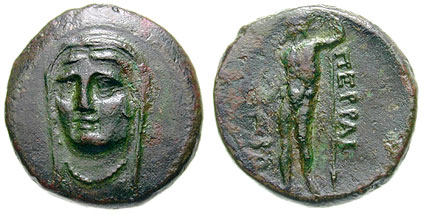
Thessaly, The Perrhaebi. ca 400-344 BC. Æ 20mm. Veiled head of Hera facing, head turned slightly left / PERRAI-BON, Zeus standing facing, holding thunderbolt in right hand, reversed spear in left.The same God that had been worshiped by other Illyrians:
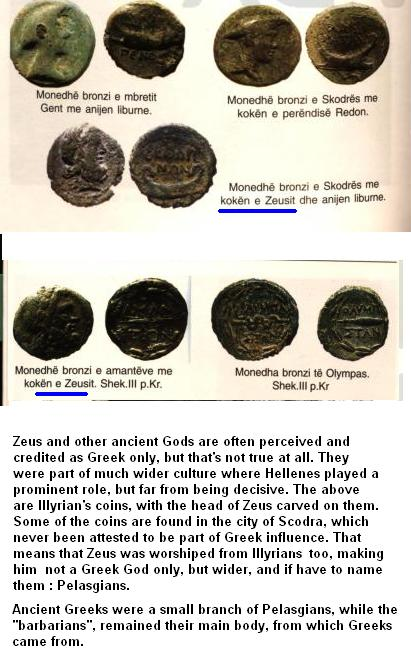
who for some ”strange reasons” together with “barbarian” Thracians :
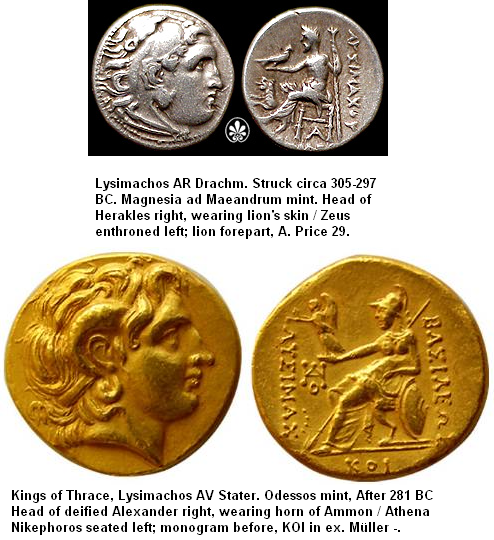
were writing in “”Greek”” and worshiping “”Greek”” Gods. We all know that this is not true. All these people were belonging to the Pelasgians, and this language and these Gods are not Greeks but Pelasgians, and this is sanctioned from Homer himself when “”””Greek””””” Achilles prays to his …….Pelasgian God:
Homer, Iliad 16.230
Ζεῦ ἄνα Δωδωναῖε Πελασγικὲ τηλόθι ναίωνAncient Hellenes as a portion of the great nation(whatever it meant in antiquity) of Pelasgians descended everything from them. It’s Pelasgians who must take the credits they deserve not the Ancient Greeks, and most of all not the Modern ones, who have no connections with them whatsoever.
Δωδώνης μεδέων δυσχειμέρου, ἀμφὶ δὲ Σελλοὶ
σοὶ ναίουσ’ ὑποφῆται ἀνιπτόποδες χαμαιεῦναι,
ἠμὲν δή ποτ’ ἐμὸν ἔπος ἔκλυες εὐξαμένοιο,
τίμησας μὲν ἐμέ, μέγα δ’ ἴψαο λαὸν Ἀχαιῶν,
Zeus, thou king, Dodonaean, Pelasgian,
thou that dwellest afar, ruling over wintry Dodona
and about thee dwell the Selli,
thine interpreters, men with unwashen feet that couch on the ground.
Aforetime verily thou didst hear my word,
when I prayed: me thou didst honour,
and didst mightily smite the host of the Achaeans
A long time has been elapsing since then but Hammond and his followers today are trying to put clear ethnic borders between the races of antiquity, drawing parallels with the today nations. This speculation deserves an end, it was only one race in antiquity speaking only one language (in many derivates), a language deeply corrupted from the Greeks today, but has somehow been naturally preserved from the Albanians. It is exactly these Albanians who are still preserving the memory of their ancient God, Zeus, his thunderbolts, embodied in their national flag as a testimony of their memory for their past:
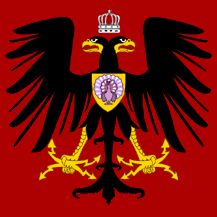
The history of antiquity is rulers’ history especially the religious ones not the history of the nations. There were not defined ethnic borders, and state-nations is a late invention of the modern rulers. As for the Ancient Greeks(whatever it meant back then), they can rule only over their graves. The myths created from whoever is in a desperate search for an identity, are being everyday exposed, and nobody in the future will be in the position to rebuild them again.

No comments:
Post a Comment